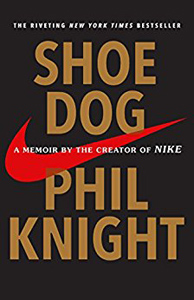 Phil Knight, Shoe Dog; A Memoir by the Creator of NIKE (New York: Scribner, 2016), 386pp.
Phil Knight, Shoe Dog; A Memoir by the Creator of NIKE (New York: Scribner, 2016), 386pp.
In 1962, Phil Knight (born 1938) was fresh out of college at the University of Oregon and Stanford Business School, with a year of service in the army, when at the age of twenty-four he had what he calls his Crazy Idea. He and Bill Bowerman, his track coach in college, ponied up $500 apiece and started Blue Ribbon Sports in order to import Japanese running shoes. It would be seven years, in 1969, before he paid himself any salary. Today, NIKE has revenues of $34 billion, 74,400 employees, and offices in 52 countries. With a net worth of $35 billion, Forbes lists Knight as the 28th richest person in the world.
There have been numerous books about NIKE, including those by former employees, and a Harvard Business School case study about the company, but here the 80-year-old founder gets to tell his own story. Learning about how a small startup of eccentric running nerds became one of the world's most powerful brands is inherently interesting, but what really makes this book hum are Knight's personal reflections.
He reflects on numerous mistakes that he now regrets. He hired a spy to infiltrate his Japanese supplier, he lied to them about Blue Ribbon's non-existent factory on the east coast, and even stole documents from them in the middle of a meeting. He repeatedly reflects on his difficult relationship with his father who criticized him for "jackassing around with shoes." He returns time and again to his failures in balancing work and family with his wife of fifty years Penny, writing at one point that "the guilt was palpable." Whereas he speaks at length about his two sons Travis and Matthew, he never mentions that he also has a daughter Christina. By nature a shy and private loner, Knight admits that no employee sacrifice was too much to ask, and that "in keeping with my personality, I expressed no gratitude. I spoke not a word of thanks or praise." Drinking among the inner circle of early employees was a regular ritual, like the "drunken bacchanal" at the Honolulu Marathon. Proud to be a rule-breaking rebel, Knight can also be dismissive of us mere mortals, the "petty bureaucrats and bean counters." He thought Magic Johnson would never make it in the NBA.
As for the NIKE he created, I also wondered about a deep contradiction. For Knight, business was always "war without bullets." They were Oregonian misfits who were proud to thumb their nose at the system. More than once he says that "it was never about the money for any of us." They were a brand, a statement, and a symbol of rebellion and iconoclasm. They bragged about breaking the rules. But now you could argue the opposite, that wearing NIKE signals cultural conformity. He actually hints at this when he writes that the company went from "a popular accessory to a cultural artifact."
My biggest disappointment with this book is that it ends in 1980 when Nike went public (the same week that a company called Apple went public!). Knight was only forty-two at that time. This memoir suggests that Phil Knight has more life wisdom to share. I want to hear more of his reflections on his life from age forty to eighty, and would eagerly read his next book.


